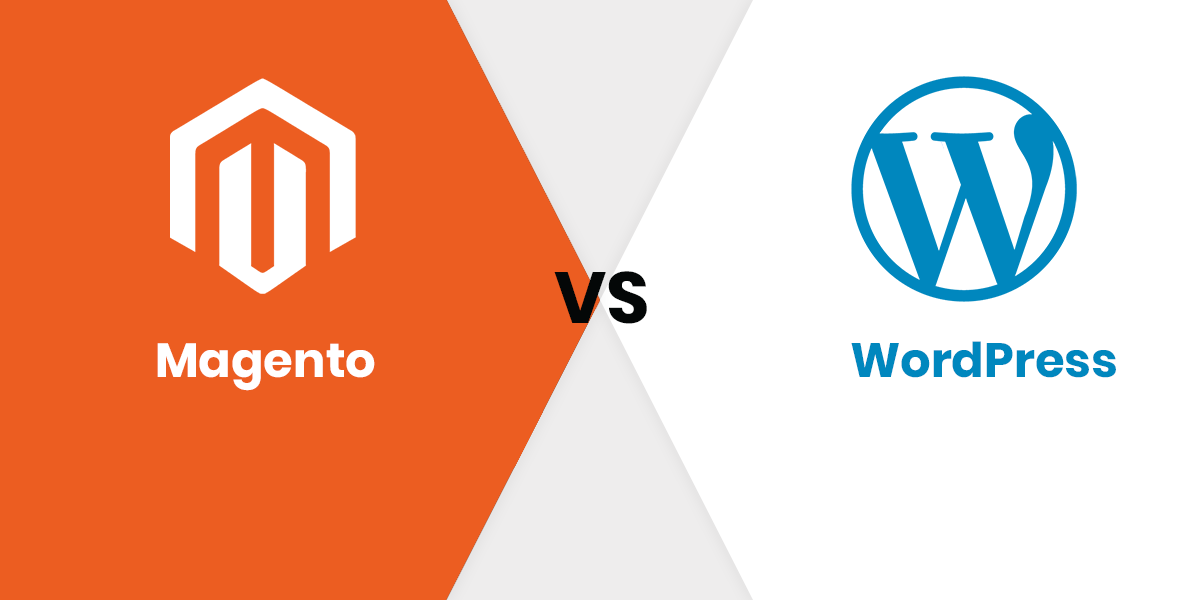Magento vs. WordPress, Which Should You Use?

Earlier, when you wanted to start a fully functional e-commerce website, you would need a hefty amount to properly run the content management system of your website. But thanks to open source tools like Magento and WordPress, you can now create a fully functional e-commerce website for your eCommerce business.
Both Magento and WordPress can be used to create your online store from scratch. Magento has a dedicated system completely working towards your online store creation. In contrast, WordPress is a comprehensive content management system but can be transformed into a fully functioning eCommerce website with the help of some ecommerce plugins like woo-commerce.
By the end of this article, you’ll know the major differences between Magento and WordPress and make a well-informed decision for your e-commerce website designing. A comparison will be drawn based on SEO friendliness and cybersecurity.
Both Magento and WordPress are powerful platforms that can be used to develop an eCommerce store for you. But, these CMSs work in entirely different ways. Magento is committed to your e-commerce store development, while WordPress cannot create you an online store without the help of certain plugins.
Both platforms support posting blogs, regular updates of site-pages, products, shopping carts, customer accounts, shipment tracking, and order history. But, just like WordPress needs plugins to support e-commerce, Magento needs additional plugins to create blog-posts.
Development –
Magento has an advanced interface for e-commerce development, which is designed especially for enterprise-level work. It lets you perform numerous integrations to your e-commerce business but has a complex development structure as compared to WordPress, which is simple to use the tool, and the framework is designed to fit with all types of users. Anybody can make website designs and layouts using WordPress, but Magento developers need a technical background.
Developing a website on Magento is not difficult, but it has to happen programmatically. It might take you some time before you get used to it. A WordPress developer might get frustrated if they are continuously working on Magento because of the complexities involved.
On the other hand, WordPress has an easy-to-use framework for those trying to integrate ideas. It has a simple interface and can be used by beginners without any technical knowledge or background. This means developing an eCommerce website on WordPress would need you to utilize a lot of plugins together if you want to make a fully functional eCommerce website on WordPress like Magento. But remember, it will take only one expired extension for your whole framework to stop.
For all those people who are worried about the features beyond code, Magento and WordPress both have built-in REST APIs, through which you can build third-party apps without any problem.
Security –
Both Magento and WordPress come with secure code servers. With years of security improvement on both these CMSs, you can be sure that your website is entirely secure.
The question comes on with add-ons and plugins, which you might require to run an eCommerce store. WordPress doesn’t have e-commerce extensions like woo-commerce by default, and installing plugins might be dangerous for your website.
Magento wins the battle here because you don’t need any plugins to effectively run your e-commerce store and hence, provide better immunity than WordPress.
Structure and SEO friendliness –
Optimizing your content on WordPress becomes easy with the YOAST plugin, which lets you write your title tag, meta description of your web pages, but doing the same in Magneto is a little complicated. However, it allows us to give the title of all the images, optimizing for search is a complicated process on Magento.
WordPress has a ton of templates to choose from, according to your website requirements, but plugins like elementor would help you edit everything that is there on the page. The structure of your website is a little complicated on Magento. Magento, because of its framework, is designed to suit business organizations naturally. The designs and layouts in Magento are far better than WordPress.
Conclusion:
If you plan to develop and list more than 500 products in your catalog, you should choose Magento over word-pressWordPress. Initially, when you are setting up the website creation process, you will enjoy WordPress because of the simple interface, but as you keep progressing, you will start facing challenges because of the order size and management.
With Magento, it is easier to use a multi admin system under a manager. Your employees can get admin access to work on the account under a master account, which is not possible with WordPress.
WordPress might give you default luxuries like blog-post writing, but it’s not recommended for stores with high traffic and operations.
WordPress, because of its hype and popularity, is driving a lot of people in, but Magento gives you a lot of benefits and takes a good lead-in comparison with WordPress CMS for building an online store.
